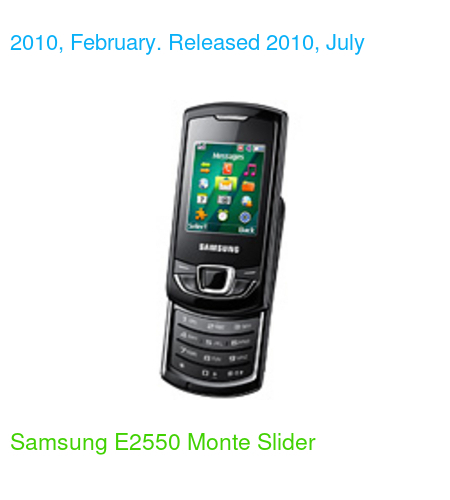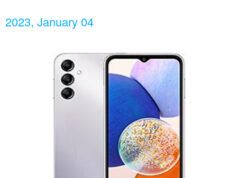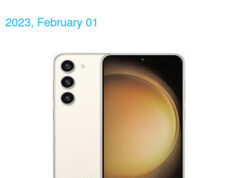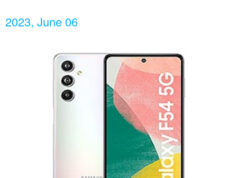| NETWORK | Technology GSM |
| Weight | 87.7 g (3.07 oz) |
| SIM | Mini-SIM |
| DISPLAY | Type TFT, 256K colors |
| Size | 2.0 inches, 12.6 cm2 (~26.4% screen-to-body ratio) |
| Resolution | 128 x 160 pixels (~102 ppi density) |
| MEMORY | Card slot microSDHC (dedicated slot) |
| Phonebook | 1000 contacts, Photocall |
| Call records | 20 dialed, 20 received, 20 missed calls |
| Internal | 13MB |
| MAIN CAMERA | Single 1.3 MP |
| Video | QCIF@15fps |
| SELFIE CAMERA | No |
| SOUND | Loudspeaker Yes 3.5mm jack No |
| COMMS | WLAN No Bluetooth 2.1, A2DP Positioning No Radio Stereo FM radio, RDS, recording USB 2.0 |
| FEATURES | Sensors Messaging SMS, MMS Browser WAP 2.0/xHTML Games Yes + downloadable Java Yes, MIDP 2.0 SNS integration MP3/WAV/WMA/eAAC+ player MP4/H.264 player Organizer Voice memo Predictive text input |
| BATTERY | Type Removable Li-Ion 800 mAh battery |
| MISC | Colors Black |
Specifications data description of this 📱Samsung E2550 Monte Slider📱
Title: “Unleashing the Power of Nostalgia: A Comprehensive Review of the Classic Mobile Device”
Introduction:
Take a trip down the memory lane with us as we delve into the fascinating features and functionalities of a classic mobile device that ruled the market in its prime. This blog post will provide you with an in-depth look at the device’s specifications, design, and performance.
Lineup:
Launched in the era of GSM technology, this device was a game-changer that set the stage for the mobile industry’s growth. The mobile device’s unique design and impressive features stood out in the market, creating a loyal fanbase and leaving a lasting impact on the industry.
Design:
Weighing only 87.7g (3.07 oz), the device’s sleek and compact design made it easy to carry and use. The mobile device boasted a 2.0 inches, 12.6 cm2 (~26.4% screen-to-body ratio) TFT display with 128 x 160 pixels (~102 ppi density) resolution. The device’s vibrant colors, smooth finish, and sturdy built made it a popular choice for many users.
Specifications:
🌐📅📈 NETWORK📅: This classic device operated on the GSM network technology, offering an exceptional communication experience for its users.
🏋️📐 BODY: With a weight of 87.7g and dimensions of 107.5 x 48.5 x 15.7 mm, the device offered a compact and comfortable fit in the palm of your hand.
🌈📱 DISPLAY: Featuring a TFT display of 2.0 inches, 12.6 cm2 (~26.4% screen-to-body ratio) with 128 x 160 pixels (~102 ppi density) resolution, the device offered a crisp and clear visual experience.
🤖📱 OS: The device operated on a proprietary operating system that powered its functionalities and applications.
🛠️💻 Chipset: The device’s chipset information is not provided.
💪💻 CPU: The device’s CPU information is not provided.
🖥️💻 GPU: The device’s GPU information is not provided.
🧠🗂️ MEMORY: The device offered 13MB of internal storage and supported up to microSDHC cards for additional storage.
📷🔍 CAMERA: The device featured a single 1.3 MP rear-facing camera, capturing decent quality images and videos.
🔈🎵 SOUND: The device featured a loudspeaker, but lacked a 3.5mm jack for audio connectivity.
📡📶 COMMS: The device offered Bluetooth 2.1, A2DP connectivity, a Stereo FM radio, RDS, recording, and USB 2.0 for data transfer.
💡🎁 FEATURES: The device offered features such as messaging, WAP 2.0/xHTML browser, games, Java MIDP 2.0, SNS integration, MP3/WAV/WMA/eAAC+ player, MP4/H.264 player, Organizer, Voice memo, and Predictive text input.
🔋🔌 BATTERY: The device was powered by a removable Li-Ion 800 mAh battery, providing decent battery life.
Conclusion:
The classic mobile device was a trailblazer that offered exceptional features and functionalities that set the standard for the mobile industry. Despite its outdated specs in today’s world, the device left an indelible impact on the mobile industry and created a loyal fanbase. We invite you to share your thoughts and memories of this classic device in the comments section below.







